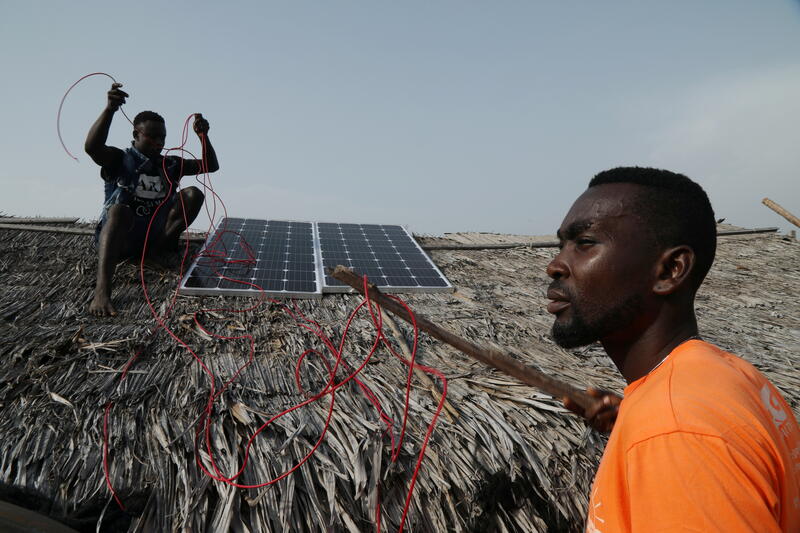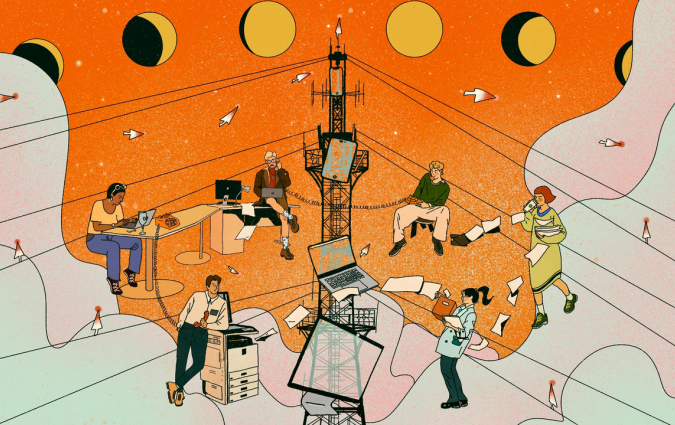The Reuters Institute launches the Oxford Climate Journalism Network to help journalists cover the climate crisis better

Technicians prepare to install a solar-powered fridge panel in Ivory Coast in February 2021. REUTERS / Luc Gnago
The Reuters Institute for the Study of Journalism is launching the Oxford Climate Journalism Network, a project designed to help journalists and newsroom leaders transform the way they cover the climate crisis.
News media remain the most widely used source of information about climate change, and it is important that journalists and editors in all media organisations are equipped to cover the issue, what it means locally as well as globally, and how it is intertwined with other areas from business to politics, so they can help people understand the realities of climate change and how we might respond to them.
The Oxford Climate Journalism Network is a unique new opportunity for participating journalists and their organisations to strengthen their competences to cover climate change, not as an isolated topic, but as something that intersects with many other aspects of our lives and societies. By providing its members with unique access to world-leading experts, professional forums for exchanging ideas with peers, and by connecting members with relevant scientists and research, the network will help reporters and editors think through the professional, organisational, and ethical questions journalism faces when it comes to climate coverage.
The focus of the network is not on individual pieces of reporting, but on working with hundreds of journalists and editors from all over the world to help them rethink and develop how journalism and the news media approach one of the defining issues of our time. It is a global network because the issue is global and because journalists everywhere can learn from one another, but it will also help participants think through the specific national and local dimensions of a crisis that affects all of us, but in very different ways.
The project is led by two co-founders, the Reuters Institute’s Deputy Director Meera Selva and Visiting Fellow and Advisory Board Member Wolfgang Blau, and is funded for the first year by a £477,170 grant from the European Climate Foundation (ECF).
The Oxford Climate Journalism Network will address some of the challenges journalists find when reporting on climate change and help editors and news media executives develop their approach to these issues. It will look at how to expand coverage across different verticals, identify reliable data sources, understand complex issues and rethink beat reporting, to ensure that an understanding of environmental issues permeates all areas of the newsroom. It will be structured around four elements:
- Online courses for practising journalists that, over 6 months, will provide members with individual support in identifying relevant sources, sessions with world-leading experts, and connect them with colleagues at other news organisations.
- Leadership programmes for senior editors and newsroom managers from around the world selected for breadth, diversity, impact and commitment to implementing change in newsrooms.
- Journalist Fellowships for mid-career journalists to join us in Oxford to work on projects related to different aspects of how news media approach climate change.
- Original academic research to track how people access climate change news in a range of countries, how and whether they share it, what they think of it, and how much trust they have in it.
Eva-Maria McCormack, Executive Director of Strategic Communications of the European Climate Foundation, said:
“The climate story continues to be intimidatingly complex, unintelligibly technical and paralysingly frightening for the majority of media audiences. Instead, it could be a story also of hope, of citizen engagement, of scrutiny on the powerful – and even a chance for a fairer future based on a new social contract. For the news media to take up that challenge and fulfill their role as guardian spirit of public debate and watchdog of the powerful, climate journalism has to be moved out of the silos of science and disaster coverage and into the centre of reporting. This requires more climate literacy among all journalists, a different mindset in the newsrooms, research on audiences and creative story-telling. The Oxford Climate Journalism Network focuses on all these angles.”
Meera Selva, Deputy Director of the Reuters Institute, said:
“The Oxford Climate Journalism Network will work with journalists and scientists around the world to rethink how we report on the most important issue of our age. Through its fellowship, leadership and research, the Reuters Institute has created a global network of journalists and editors and it is exciting to be able to expand that to look at climate change, carbon emissions, and the future of our environment."
Wolfgang Blau, Co-Founder of the network, said:
"The accelerating climate crisis poses questions to all verticals of a news organisation, whether that is in their science, politics, business, culture, health, lifestyle, technology or sports journalism. The Oxford Climate Journalism Network will provide journalists and newsroom managers with knowledge, advice, research and professional forums on how to expand and improve their coverage of climate change. I would like to thank the Reuters Institute, the European Climate Foundation and the University of Oxford for their support and partnership in this critical endeavour."
Rasmus Nielsen, Director of the Reuters Institute, said:
“The Oxford Climate Journalism Network will help journalists all over the world develop the skill sets and connections they need to deliver the climate coverage we all need to understand and address the climate crisis. I am very grateful to the European Climate Foundation for their support for this project, to network co-founder Wolfgang Blau for suggesting the idea and all his work on shaping it, and to Meera Selva for taking the lead on it here at the Institute.”
Notes:
The European Climate Foundation is an independent philanthropic initiative dedicated to responding to the global climate crisis by creating a net-zero greenhouse gas emissions society. It pursues strategic philanthropy to support the climate community in shaping public debate and forging bold climate solutions. Together with hundreds of partner organisations it is at the forefront of a global movement to ensure a liveable planet for future generations.
The Thomson Reuters Foundation is the core funder of the Reuters Institute, based in the Department of Politics and International Relations at the University of Oxford. The Institute was launched in November 2006 and developed from the Reuters Fellowship Programme, established at Oxford more than 35 years ago. The Institute, an international research centre in the comparative study of journalism, is committed to exploring the future of journalism worldwide through debate, engagement, and research.
More on climate change from the Reuters Institute:
- Listen to this episode of our podcast, with co-founders Meera Selva and Wolfgang Blau discussing how newsrooms can improve their climate coverage
- Read this chapter from our Digital News Report 2020 authored by Simge Andı on how people get their news about climate change
- Read this book by our Research Associate James Painter on how the news media is covering climate change.
- Read this piece by our contributor Laura Oliver on what solutions journalism can add to the coverage of climate change and other issues in the Global South
- Read this essay by Wolfgang Blau on why covering climate change requires newsroom change
- Read this piece by Meera Selva on why we need a new local language of climate change reporting
- Read this paper by our Journalist Fellow Adele Santelli with lessons newsrooms can learn from Brazilian journalists covering the environment and the climate crisis






